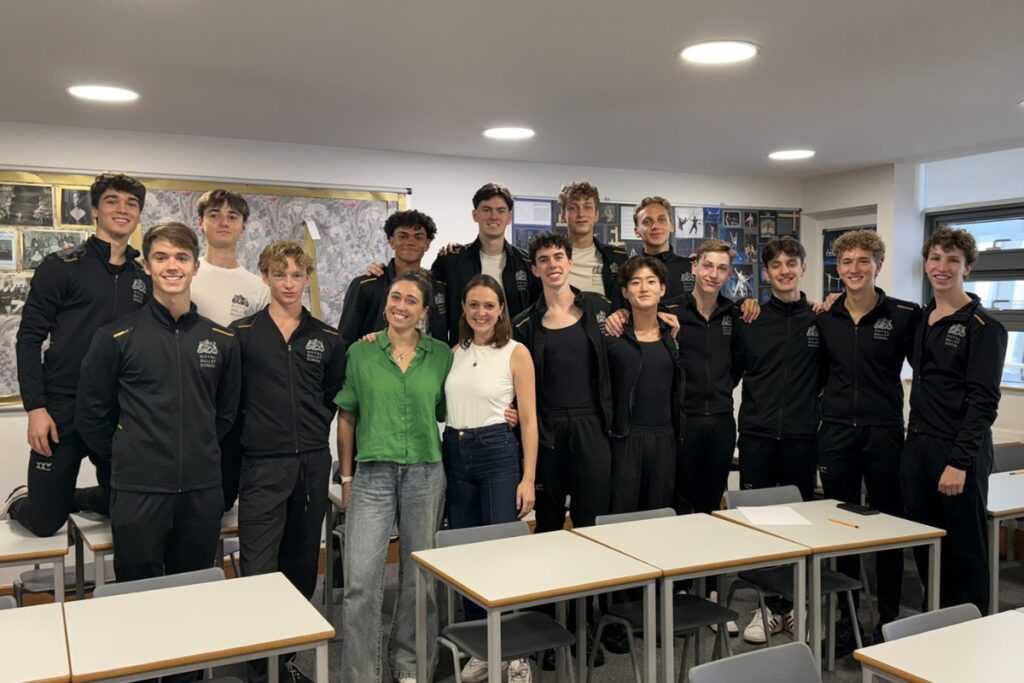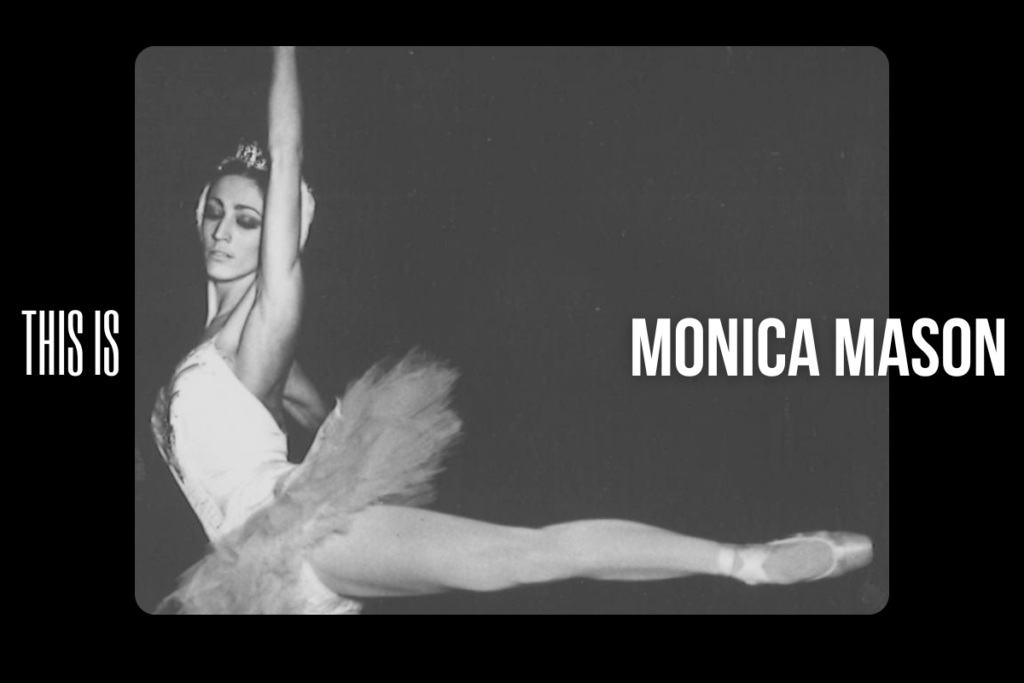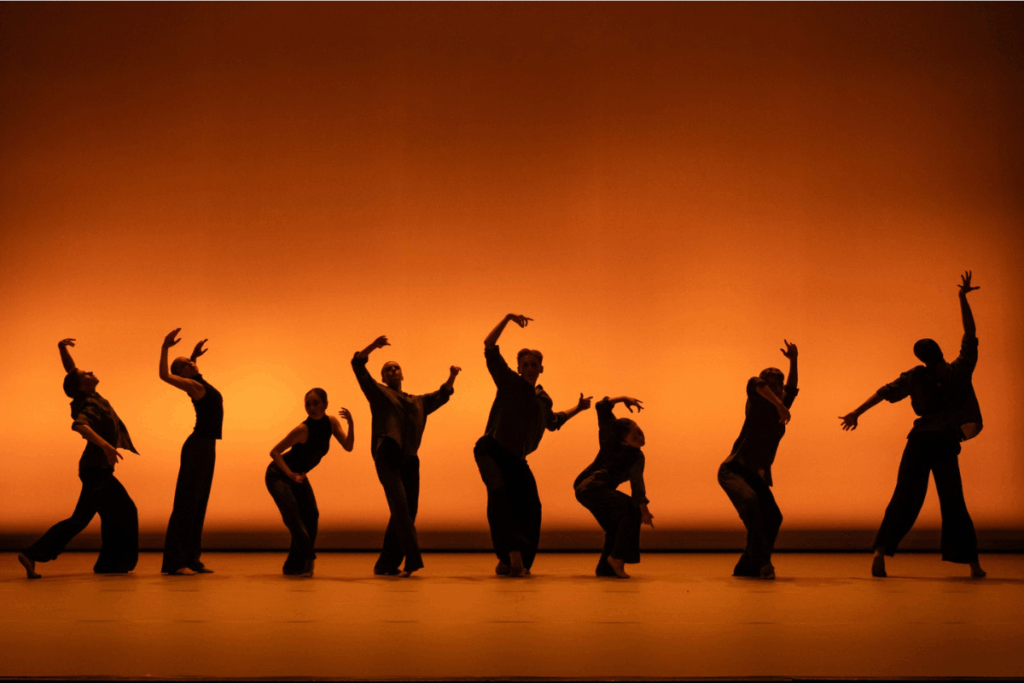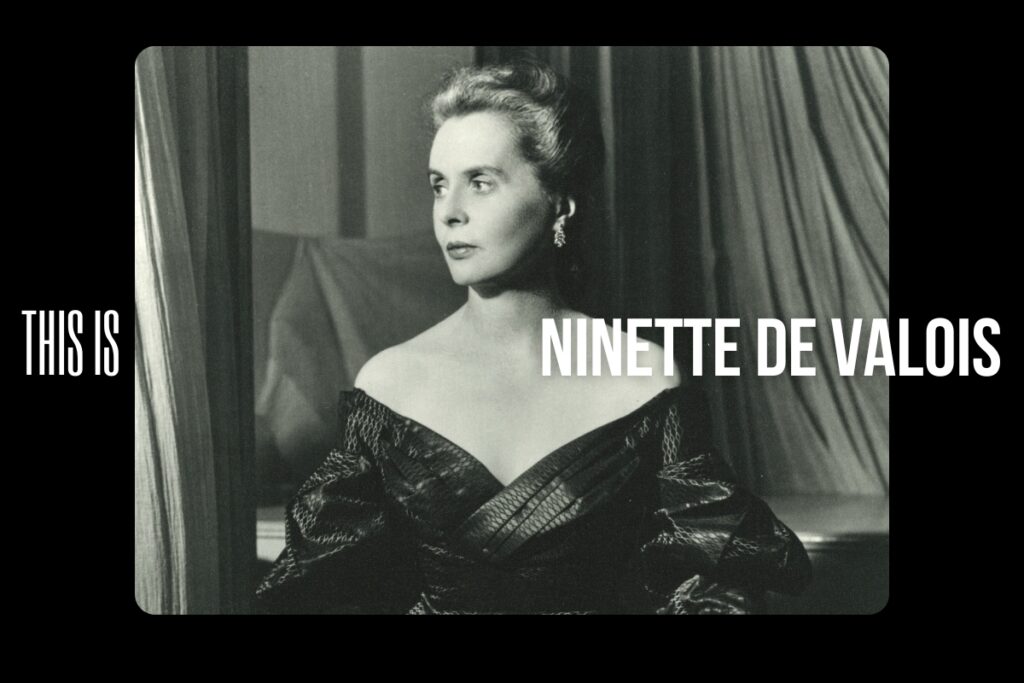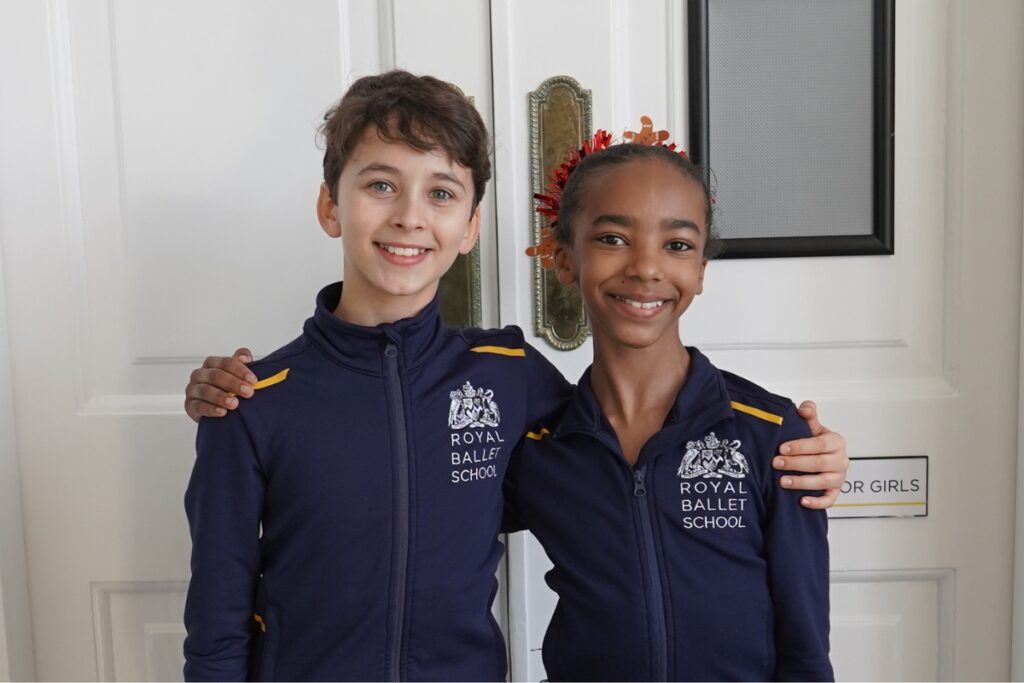‘Be brave enough to pivot and have the courage to take a risk.’ Alumni Araminta Wraith and Nicky Henshall share testimonials about Dancer’s Career Development
Araminta Wraith and Nicky Henshall returned to the School earlier this year for a presentation and Q & A with our Pre-professional male students about Dancers Career Development (DCD), a charity that provides career retraining support and mentorship for dancers at all stages of their careers.
Araminta is a Schools Workshop Facilitator for DCD and a former dancer with English National Ballet (ENB) and Scottish Ballet. She hosted the discussion with her close friend and fellow alumna, Nicky, who was a recipient of the DCD Exploration Grant, funding which also supports teachers in our Diploma of Dance Teaching programme.
What is DCD?
Araminta began the workshop with a general overview of what DCD can offer students and professional dancers throughout their careers. In addition to Evolve workshops, which provide networking opportunities for artists, the charity also offers two grants: the Exploration grant, which Nicky received for career development training, and the Retraining grant, which Araminta received for her degree at the Royal Academy of Dramatic Art and subsequent career pivot into acting.
The amazing thing about DCD is that it’s totally independent. Sometimes, you don’t always want to speak up in the environment that you’re in. DCD are completely independent and confidential. So, you could ring up and say, ‘I think I need some one-to-one confidential support.’ And DCD will say, ‘Okay, where are you dancing? What’s your story?’ No matter what, they’ll try and find a way to help you.
They can arrange for a life coach that’s worth £100, but you will only pay £30 to get a session to talk to someone about your career, any struggles or goal setting. Even if you’re not struggling but have a big ambition and need help navigating it, someone will talk to you, and, in the real world, this is very hard to come by.
Nicky’s student life
Nicky followed by giving a frank recollection of the challenges, transitions and highlights of her career, thanks in great part to DCD’s resources. Her journey began at 14, when she moved to White Lodge from her home in Stoke-on-Trent.
I look back at that time and see it as the most intense period of my life in such a pressured environment, but that really set me up to have resilience, an incredible work ethic, to be motivated and disciplined.
I got used to being a student and trusted my teachers. I had really supportive peers in my year and felt familiar with these surroundings. I worked a lot with the Company and felt like, although it was stressful, I knew how to do it. I had been taught well. I got it.
In her Pre-professional year, she performed in a piece that Wayne McGregor created on the students at the University of Utah. English National Ballet’s then Artistic Director, Wayne Eagling, watched a show and offered Nicky a job shortly after.
I found out in March, halfway through my Pre-professional year. I was really happy to be staying in the UK. I wanted to stay close to my family, and I loved London and wanted to stay. I was looking forward to it, and I felt proud that I got a job.
Transition to professional life and enduring injuries
Despite her initial excitement and confidence, Nicky found the immediate shift from student to company life overwhelming.
I found that first transition year really difficult. I don’t think I was prepared for the massive change. Even though I was staying in the UK, going into a big company and had trained every day at school, I wasn’t prepared to be my own teacher, supporter and champion. I look back and think, gosh, I just wish I’d been a bit kinder to myself because it is a struggle, even if you are lucky enough to transition straight into a company.
Unfortunately, injuries plagued her first years of professional life, adding more stress to the transition. She said that as a student eager to begin her career, she never thought about what she would do if her body was not cooperating.
I went into a pretty dark place, and, even though I had good support around me, I just thought, ‘This isn’t making me feel great. I’m not very happy.’ And that was really difficult to acknowledge, because that’s all I’d known. I left home at 14, and I was so passionate. I was obsessed with dance. I wanted to be the best I could be, and I had big aspirations for myself as a dancer. What I think I failed to consider was that I didn’t have massive aspirations as a human, as in what I needed to succeed as a dancer and a human together.
Throughout her early 20s, Nicky rarely enjoyed performances between bouts of rehabilitation, battling near constant injury. She met with then-Artistic Director Tamara Rojo to discuss her future.
I still remember these words, and I’m proud of my 25-year-old self for saying, ‘I want to leave now and still love what I do, ballet and dance. I want a chance to return in my own way rather than stay here for the next five years. I feel like I’m so far down the trenches, and I don’t know how I’m going come back up.’
Ultimately, I felt like it was not fulfilling me. I made the decision to leave ENB without another job. I knew I needed to get out now, figure stuff out, then redirect and pivot. That was such a massive turning point, because I took initiative of my own journey, growth and career, something I hadn’t been used to as a student or as a young professional.
Career reset and pivot
Nicky returned to Stoke-on-Trent to recover with her family, living at home for the first time in a decade since she moved to White Lodge.
My transition back home was actually quite smooth because I really needed to recover mentally and physically. It was scary, but I had this new lease of motivation, because I felt like I was back in control of what I wanted and what I was.
She took a mentoring programme with Kerry Nicholls, who helped her find her passion for dance again.
If I can give you one bit of advice, it’s to find the people that support you, whether that’s a friend, mentor or someone that you look up to, so they can be an anchor and a mentor to you. Kerry helped me, and I slowly fell back in love with ballet.
Nicky founded Staffordshire Youth Ballet, a youth training programme in the Midlands, and discovered a new passion for teaching. She performed in smaller projects for eight years after leaving ENB, and although she was offered a job at the Royal Ballet of Flanders, she decided not to accept.
I was in a musical programme by Christopher Wheeldon then. I’ve been in musical operas. I explored many other genres of dance, and I was super happy being more in control of my path. I also realised that the rigidity, control and systems of a ballet company weren’t for me. It was a relief to realise that that is not what works for me, and that’s okay, even though I really fought it for so long.
She met Akram Khan and returned to ENB to work as a research and development dancer for his new project, Giselle, helping him develop choreography before he set it on the company.
I worked for the first time on a creative process that I had no endgame of performing, and I really, really enjoyed it. I loved working with him. He’s a very innovative, intelligent, creative man. Then, I worked with the company alongside the dancers who I used to be with every day, but now I was assisting his process rather than learning from a dancer’s point-of-view. That led to me exploring the role of a rehearsal director.
Nicky later became the rehearsal director for Akram’s company and continues to work with other ballet companies performing his repertory worldwide.
Looking forward
Nicky continued enriching her freelance work with help from DCD’s Exploration Grant, which she used for yoga and teacher training in India. She recently started a course to become a trained psychotherapist and hopes to merge counselling, movement therapy and somatic work in the next chapter of her multifaceted career. She wants her story to be an example of resilience and adaptability for the students.
Figure out what you need for yourself and figure out what you want. Source out the people that you trust and respect, who you think are going to help you. Listen to yourself when you’re getting stuck, be very vocal in taking accountability and initiative, and trust that you know how you feel. Be brave enough to pivot and have the courage to take a risk, because you don’t know where it will lead to, and what doors it might open. Have an open mind about your future.
She ended by talking about circles of control and influence, reminding students to focus their energy on the actions and attitudes they have power over rather than worrying about what might happen.
This is a perfectionist art form. We’re constantly seeking and working towards that perfection. Then suddenly, you’re in a room with principals and people that you’ve never worked with before. You start to doubt yourself. But you’re still 19. You’re growing. So, that’s totally normal. That’s why I say to find mentors, because they are going to help you.


